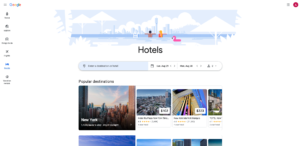Best Practices For Improving Your Hotel’s PPC Advertising Performance

Commanding the top spot on Google and other search engines is critical for hotels to drive traffic and bookings to their website, which makes Pay Per Click advertising one of the most important hospitality digital marketing strategies in today’s competitive market.
Pay-Per-Click advertising (PPC) is one of the most popular and effective ways for hotels to advertise their features. PPC ads, or sponsored listings on search engines like Google and Bing, are a great way to get your property in front of potential customers who are actively searching for specific, targeted keywords. Google, which controls 92% of the search engine market, processes 5.6 billion searches each day. According to data, 28.5% of clicks on Google are on the first result (15.7% are on the second). With PPC advertising, you can command the top of search engine results for strategic keywords and drive more potential guests to your website instead of a third-party booking platform or competitor.
Looking to improve the performance of your PPC ads? Focus on these five optimizations.
1. Hone in on your target keywords
Pay-Per-Click campaigns are only as good as the keywords you choose to target. You wouldn’t want your ad to show up when someone is searching for something completely unrelated, right? It’s wasted ad spend and potentially a missed opportunity to reach a more qualified guest. It’s important that hospitality marketers do their homework or work with an agency before setting up a PPC advertising campaign, determine what terms people use when they search online for hotels, and then continually optimize them.
Looking at the list of the most common travel searches can initially be disheartening for marketers. Some of the top searches related to travel include:
- TripAdvisor
- Trivago
- Marriott
- Hotel
- Hotels Near Me
Sure, it would be difficult for most hotels to rank highly on search engine results pages for those terms. The positive is that targeting these broad keywords isn’t the best solution for your hotel’s PPC strategy. Think about what somebody looking for your hotel might search for. What questions are they asking? Many people search online with specific phrases known as ‘long-tail keywords.’ For hotels, that could be something like ‘Best Hotel near the Grand Canyon’, or ‘San Diego hotel with ocean view.’
Focusing in on long-tail keywords can help hoteliers reach a more qualified guest. Plus, they tend to produce higher conversion rates because of their specificity and are more cost-effective. Bidding on keywords such as ‘San Diego Hotel,’ tend to be more expensive due to competition for the keywords, eating up your budget faster. But if your hotel isn’t reaching a high volume with your long-tail keywords, or if you don’t face stiff competition for local keywords, making them more broad is a strong option.
Other keyword considerations include bidding on branded keywords, which are terms that include your hotel’s name, address, and phone number. Depending on your hotel, Online Travel Agencies (OTAs) or competitors could be taking part in a ‘search conquesting’ campaign and bidding on your brand so their agency or hotel shows up first when someone searches for your hotel. Meanwhile, implementing negative keywords can save your hotel’s ad spend. You don’t want people (including guests) who are simply looking for your address or phone number to be served your ad — every click costs you money!
2. Adjust how your hotel’s ads appear on different devices
Another way to improve your Pay-Per-Click advertising performance is by adjusting where your ads show up for users. For example, if a lot of potential guests are searching on tablets or mobile devices, you can consider making slight bid adjustments. More importantly, you should think about how your ads are appearing to these users, who are oftentimes in a different stage of the booking process.
Did you know that more than 60% of Google searches come from mobile devices and in recent years 69% of all PPC clicks came from mobile devices? Mobile advertising is becoming increasingly important for hotels to pay attention to. On top of that, mobile users, especially ones searching for terms such as ‘Hotels Near Me,’ engage in the highest percentage of last-minute bookings. Incorporating more urgent messaging or including a specific offer could potentially lead to higher click-through and conversion rates.
3. Focus on the quality score of your ads
Pay-Per-Click advertising campaigns are only as good as the quality score of your ad. The ‘Quality Score’ is a number that Google assigns to each PPC campaign based on several factors, including click-through rate (CTR), relevance, and landing page experience. The higher the quality score, the less you typically pay for every click your ad generates. Paying for ads with a low-quality score can quickly eat into your hotel’s advertising budget and can have negative consequences on your campaign’s efficiency.
In order to achieve the highest ad quality score possible, hotel marketers should ensure their PPC campaigns follow these tips:
Keyword Relevance: The more specific your PPC ads’ keywords are to what potential guests search for, the better. For instance, if a guest is searching for ‘New York hotels,’ a PPC ad with the keyword ‘NYC hotel’ will likely have a better quality score than one that reads ‘best hotel.’ Ads that are relevant to the search query, website, and even device will yield a higher quality score.
Landing Page Experience: Your campaign’s landing pages should be just as relevant to what your potential guests searched so they can convert to actual hotel reservations. PPC campaigns that send guests to a page with irrelevant information or an unoptimized booking engine will have lower quality scores. It’s important for marketers not to overlook this. Google will crawl your landing page to evaluate the user experience and how relevant the content is to your ad copy.
Other Factors: There are several other factors Google considers when determining your ads’ quality score. While Google doesn’t give away the full secret, ads that take into account the above and have high click-through rates tend to perform better than those with low scores.
Ultimately, your quality score is important because it determines which kind of bids Google recommends for your campaign’s keywords in order to get the best results possible. The higher your quality score, the higher your ads will be placed on the results page. In other words, marketers should work to achieve the highest PPC ad quality scores possible so they can spend more efficiently on keywords.
4. Incorporate extensions for callouts, offers, and more
Google allows advertisers to include extensions on ads, which offer users interactive elements to get more information, make a call, visit your website, or take advantage of an offer. Not only do extensions produce higher click-through rates, but they also take up more real estate at the top of the page.
While there are a number of extensions available, five are most beneficial for hoteliers:
Location Extension: With the location extension, you have the ability to show where your hotel is located on a map, making it easy for potential guests to find you or see what else is nearby.
Call Extension: The call extension allows hotels to add a clickable phone number, which will allow travelers to easily call the hotel. This is especially critical for mobile ads and can increase your CTR on mobile devices. Plus, Google can still count these calls as conversions.
Sitelink Extension: A sitelink extension allows advertisers to display multiple links. Your hotel can include up to four website links, meaning you can send travelers to your hotel’s rooms page, restaurant page, or a variety of other engaging pages on your website.
Review Extension: By utilizing the review extension, hoteliers can display customer reviews and testimonials on their PPC ads. When potential guests see these testimonials about the hotel, they are more likely to click through and make a reservation at your establishment
Callout Extension: The callout extension is text-based and gives hoteliers the opportunity to highlight specific features or amenities or special offers from your hotel.
Ad extensions can improve your quality score and thus the ranking of your ad on Google. Not only that, but extensions provide users more options and tend to result in higher click-through rates. According to Google, advertisers can see a 10-15% increase in CTR by implementing a new ad extension.
5. Take advantage of Google’s Hotel Ads offering

As Google has commanded the lion’s share of PPC advertising spend across the Internet, it has devised other ways to engage travelers and, in turn, has broadened its advertising offering for hotels.
Google Hotel Ads, which falls under the metasearch marketing category, is an effective way to increase bookings at your hotel. It allows hotels to show ads of their best rooms and amenities directly in the search results on Google Hotels, or even at the top of the search engine results page, meaning the ads are highly targeted. Because these ads meet the traveler where they are looking and offer interactivity, there are some benefits, including:
- Reaching travelers who are searching in your location
- Dynamic pricing and room availability
- Allowing guests to book immediately or on your website
PPC advertising is a critical way for hotels to increase online visibility and convert travelers into bookings. With so many people searching for hotels every day, it’s important that hoteliers command the top position on search engines in order to attract prospective customers. In the end, that is easier said than done. A successful PPC campaign takes constant monitoring and optimizations.
Interested in talking with us about your PPC campaign? We’d love to hear from you. Otherwise, visit our Resource Center to read our other hospitality marketing tips.

